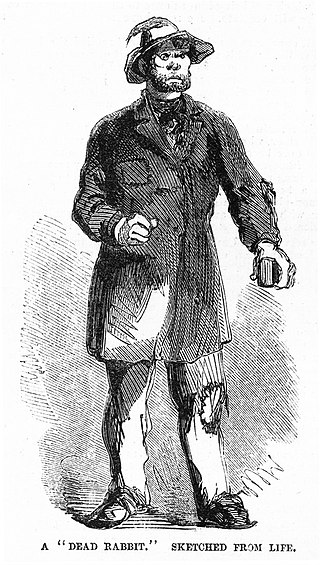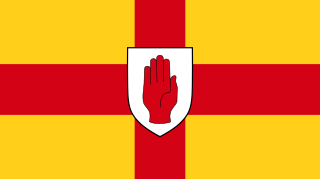"Lillibullero" is a march attributed to Henry Purcell that became popular in England at the time of the Glorious Revolution of 1688.

The Dead Rabbits was the name of an Irish American criminal street gang active in Lower Manhattan in the 1830s to 1850s. The Dead Rabbits were so named after a dead rabbit was thrown into the center of the room during a gang meeting, prompting some members to treat this as an omen, withdraw, and form an independent gang. Their battle symbol was a dead rabbit on a pike. They often clashed with Nativist political groups who viewed Irish Catholics as a threatening and criminal subculture. The Dead Rabbits were given the nicknames of "Mulberry Boys" and the "Mulberry Street Boys" by the New York City Police Department because they were known to have operated along Mulberry Street in the Five Points.
The Liverpool Protestant Party (LPP) was a minor political party operating in the city of Liverpool in northwest England.

Sectarianism in Glasgow takes the form of long-standing religious and political sectarian rivalry between Catholics and Protestants. It is particularly reinforced by the fierce rivalry between Celtic F.C. and Rangers F.C., the two largest Scottish football clubs sometimes referred to as the Old Firm, whose support base is traditionally predominantly Catholic and Protestant respectively. A 2003 report for Glasgow City Council indicated that people clearly believe "sectarianism is still prevalent in Glasgow", but that members of the public were divided on the strength of the relationship between football and sectarianism.

"Billy Boys", also titled "The Billy Boys", is a loyalist song from Glasgow, sung to the tune of "Marching Through Georgia." It originated in the 1920s as the signature song of one of the Glasgow razor gangs led by Billy Fullerton and later became viewed to reflect the long-running sectarian religious hatred directed by some Protestants against Catholics in the city. It is associated in particular with Rangers F.C.

The Twelfth is an Ulster Protestant celebration held on 12 July. It began in the late 18th century in Ulster. It celebrates the Glorious Revolution (1688) and victory of Protestant King William of Orange over Catholic King James II at the Battle of the Boyne (1690), which ensured a Protestant Ascendancy in Ireland. On and around the Twelfth, large parades are held by the Orange Order and Ulster loyalist marching bands, streets are bedecked with British flags and bunting, and large towering bonfires are lit in loyalist neighbourhoods. Today the Twelfth is mainly celebrated in Northern Ireland, where it is a public holiday, but smaller celebrations are held in other countries where Orange lodges have been set up.

The Roman Catholic Relief Act 1829, also known as the Catholic Emancipation Act 1829, was passed by the Parliament of the United Kingdom in 1829. It was the culmination of the process of Catholic emancipation throughout the United Kingdom of Great Britain and Ireland.

The Loyal Orange Institution, commonly known as the Orange Order, is an international fraternal movement based in Northern Ireland and primarily associated with Ulster Protestants (it also has lodges in England, Scotland and the Republic of Ireland, as well as in parts of the Commonwealth of Nations and the United States. Most of the organization's lodges are located in Ireland, England, and Scotland, although others can be found throughout the British Commonwealth, including Canada, Australia, New Zealand and Africa. The lodges of every country are independent, but the Orange Order meets in a triennial world council. The Orange Order was founded by Ulster Protestants in County Armagh in 1795, during a period of Protestant–Catholic sectarian conflict, as a fraternity sworn to maintain the Protestant Ascendancy in Ireland. It is headed by the Grand Orange Lodge of Ireland, established in 1798. Its name is a tribute to the Dutch-born Protestant king William of Orange, who defeated Catholic king James II in the Williamite–Jacobite War. The order is best known for its yearly marches, the biggest of which are held on or around 12 July, a public holiday in Northern Ireland
Upperlands is a small village in County Londonderry, Northern Ireland. It is situated 3 miles north east of Maghera. It lies within the civil parish of Maghera, the historic barony of Loughinsholin, and is situated within Mid-Ulster District. In the 2011 Census it had a population of 561 people.

The Newfoundland Tricolour, or the Pink, White and Green, is an unofficial flag seen in the Canadian province of Newfoundland and Labrador, and is mistakenly believed to have been an official Flag of Newfoundland and Labrador, or more commonly, of the island of Newfoundland specifically.

Sandy Row is a large inner city estate in south Belfast, Northern Ireland. It lends its name to the surrounding residential community, which is predominantly Protestant working-class. The Sandy Row area had a population of 2,153 in 2001; in 2018, the population was estimated to be around 4,000. It is a staunchly loyalist area of Belfast, being a traditional heartland for affiliation with the paramilitary Ulster Defence Association (UDA) and the Orange Order.
Anti-Irish sentiment includes oppression, persecution, discrimination, or hatred of Irish people as an ethnic group or a nation. It can be directed against the island of Ireland in general, or directed against Irish immigrants and their descendants in the Irish diaspora. This sentiment can also be called Hibernophobia.
Parades are an important part of the culture of Northern Ireland. Although the majority of parades are held by Ulster Protestant, unionist or Ulster loyalist groups; Irish nationalist, republican and non-political groups also parade. The Parades Commission exists to settle disputes about controversial parades, and although not all parading groups recognise the Commission's authority, its decisions are legally binding.

The European wars of religion were a series of wars waged in Europe during the 16th, 17th and early 18th centuries. Fought after the Protestant Reformation began in 1517, the wars disrupted the religious and political order in the Catholic countries of Europe, or Christendom. Other motives during the wars involved revolt, territorial ambitions and great power conflicts. By the end of the Thirty Years' War (1618–1648), Catholic France had allied with the Protestant forces against the Catholic Habsburg monarchy. The wars were largely ended by the Peace of Westphalia (1648), which established a new political order that is now known as Westphalian sovereignty.

The Drumcree conflict or Drumcree standoff is a dispute over yearly parades in the town of Portadown, Northern Ireland. The town is mainly Protestant and hosts numerous Protestant marches each summer, but has a significant Catholic minority. The Orange Order insists that it should be allowed to march its traditional route to and from Drumcree Church on the Sunday before the Twelfth of July. However, most of this route is through the mainly Catholic/Irish nationalist part of town. The residents, who see the march as sectarian, triumphalist and supremacist, have sought to ban it from their area. The Orangemen see this as an attack on their traditions; they had marched the route since 1807, when the area was mostly farmland.

In Northern Ireland, the Eleventh Night or 11th Night, also known as "bonfire night", is the night before the Twelfth of July, an Ulster Protestant celebration. On this night, large towering bonfires are lit in Protestant loyalist neighbourhoods, and are often accompanied by street parties and loyalist marching bands. The bonfires are mostly made of wooden pallets. They originally celebrated the Williamite conquest of the 1690s, which began the Protestant Ascendancy in Ireland. Eleventh Night events are regularly condemned for sectarianism or ethnic hatred against Irish Catholics and Irish nationalists, such as the burning of Irish tricolours, and for damage and pollution caused. Some are controlled by loyalist paramilitaries, and authorities may be wary of taking action against controversial bonfires. Not all bonfires are controversial however, and there have been attempts to de-politicize some bonfires and make them more family-friendly and environmentally-friendly. In 2021, there were about 250 Eleventh Night bonfires.

Orange marches are a series of parades by members of the Orange Order and other Protestant fraternal societies, held during the summer months in various Commonwealth nations, most notably Ulster. The parades typically build up to 12 July celebrations marking Prince William of Orange's victory over King James II & VII at the Battle of the Boyne in 1690.

The national flag of Ireland, frequently referred to in Ireland as 'the tricolour' and elsewhere as the Irish tricolour is a vertical tricolour of green, white and orange. The proportions of the flag are 1:2.
Ulster Protestants are an ethnoreligious group in the Irish province of Ulster, where they make up about 43.5% of the population. Most Ulster Protestants are descendants of settlers who arrived from Britain in the early 17th century Ulster Plantation. This was the settlement of the Gaelic, Catholic province of Ulster by Scots and English speaking Protestants, mostly from the Scottish Lowlands and Northern England. Many more Scottish Protestant migrants arrived in Ulster in the late 17th century. Those who came from Scotland were mostly Presbyterians, while those from England were mostly Anglicans. There is also a small Methodist community and the Methodist Church in Ireland dates to John Wesley's visit to Ulster in 1752. Although most Ulster Protestants descend from Lowland Scottish people and English, some also descend from Irish, Welsh and Huguenots.













